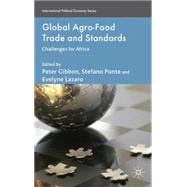
Note: Supplemental materials are not guaranteed with Rental or Used book purchases.
Purchase Benefits
What is included with this book?
| List of Tables, Figures and Map | p. viii |
| Acknowledgements | p. xi |
| Notes on Contributors | p. xii |
| List of Acronyms | p. xvi |
| Agro-Food Standards and Africa: An Introduction | p. 1 |
| Governing through standards | p. 1 |
| Trends in agro-food standards | p. 3 |
| Standards, global value chain restructuring and exclusion | p. 10 |
| Interventions aimed at greater inclusivity | p. 14 |
| The contributions to this volume | p. 18 |
| Product Carbon Footprint Standards and Schemes | p. 21 |
| Introduction | p. 21 |
| Why carbon footprinting? | p. 23 |
| Methodological issues in product carbon footprinting | p. 24 |
| ISO environmental standards and carbon footprinting | p. 26 |
| Characteristics of product carbon foot printing schemes | p. 28 |
| Consumer perceptions of and reactions to PCF | p. 388 |
| Discussion and conclusion | p. 39 |
| Institutional Capacity for Food Safety Conformity in Tanzania | p. 43 |
| Introduction | p. 43 |
| The spice sector in Tanzania | p. 45 |
| Standards for spices | p. 45 |
| Local capacity for standards conformity assessment | p. 55 |
| Concluding remarks | p. 66 |
| An Analysis of Organic Contract Farming Schemes in East Africa | p. 70 |
| Introduction | p. 70 |
| Contract farming in Africa | p. 71 |
| The economics of organic farming | p. 74 |
| The organic contract farming schemes surveyed | p. 75 |
| Research questions and methods | p. 82 |
| Results | p. 85 |
| Interpretation | p. 94 |
| Conclusion | p. 96 |
| Appendix: analytical strategy | p. 98 |
| Challenges and Opportunities of Organic Agriculture in Tanzania | p. 101 |
| Introduction | p. 101 |
| Background | p. 101 |
| Developments in organic production, processing and marketing in Tanzania | p. 103 |
| Problems, prospects and future outlook of the organic sector | p. 109 |
| Conclusion | p. 111 |
| Appendix | p. 112 |
| Sustainability Standards and Agro-Food Exports from East Africa | p. 120 |
| Introduction | p. 120 |
| Sustainability standards | p. 121 |
| The standards and their local adoption | p. 123 |
| UTZ CERTIFIED coffee in Tanzania | p. 125 |
| GlobalGAP certified vegetables in Tanzania | p. 127 |
| Social standards in the cut flower industries of Kenya and Tanzania | p. 131 |
| Conclusion | p. 134 |
| Localizing Private Social Standards: Standard Initiatives in Kenyan Cut Flowers | p. 136 |
| Introduction | p. 136 |
| Private social standards and cut flowers in Kenya | p. 138 |
| Kenyan social standard initiatives | p. 144 |
| Conclusion | p. 157 |
| Food Safety Standards and Fishery Livelihoods in East Africa | p. 162 |
| Introduction | p. 162 |
| The development of the Nile perch value chain in East Africa | p. 164 |
| Livelihood dimensions | p. 169 |
| Conclusion | p. 182 |
| When the Market Helps: Standards, Ecolabels and Resource Management Systems in East African Export Fisheries | p. 184 |
| Introduction | p. 184 |
| Meeting food safety standards | p. 185 |
| Sustainability and fishery management systems | p. 190 |
| Ecolabelling | p. 195 |
| Conclusions | p. 200 |
| European Food Safety Regulation and Developing Countries' Regulatory Problems and Possibilities | p. 205 |
| Introduction | p. 205 |
| The EU's food safety regime | p. 205 |
| Identifying the barriers | p. 206 |
| Overcoming the barriers | p. 217 |
| Perspectives for the future | p. 223 |
| Appendix: Application of the European food safety regime and developing countries | p. 225 |
| Conclusion | p. 232 |
| The content, coverage and proliferation of standards | p. 232 |
| The governance of standards, local participation and issues related to conformity | p. 234 |
| Standards, value chain restructuring and welfare outcomes | p. 239 |
| Final remarks | p. 242 |
| References | p. 244 |
| Index | p. 265 |
| Table of Contents provided by Ingram. All Rights Reserved. |
The New copy of this book will include any supplemental materials advertised. Please check the title of the book to determine if it should include any access cards, study guides, lab manuals, CDs, etc.
The Used, Rental and eBook copies of this book are not guaranteed to include any supplemental materials. Typically, only the book itself is included. This is true even if the title states it includes any access cards, study guides, lab manuals, CDs, etc.